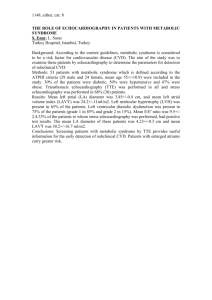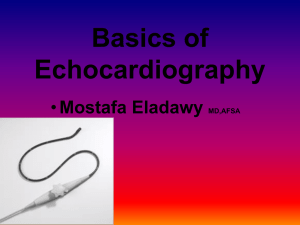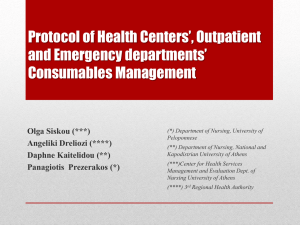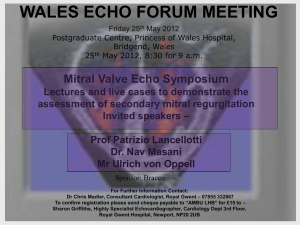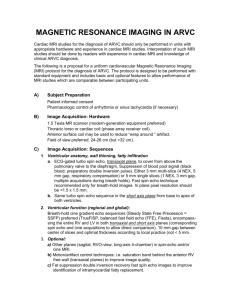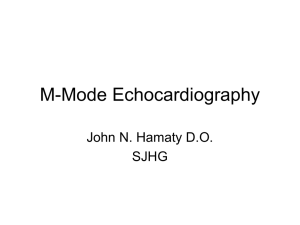Goals and Objectives ECHO
advertisement
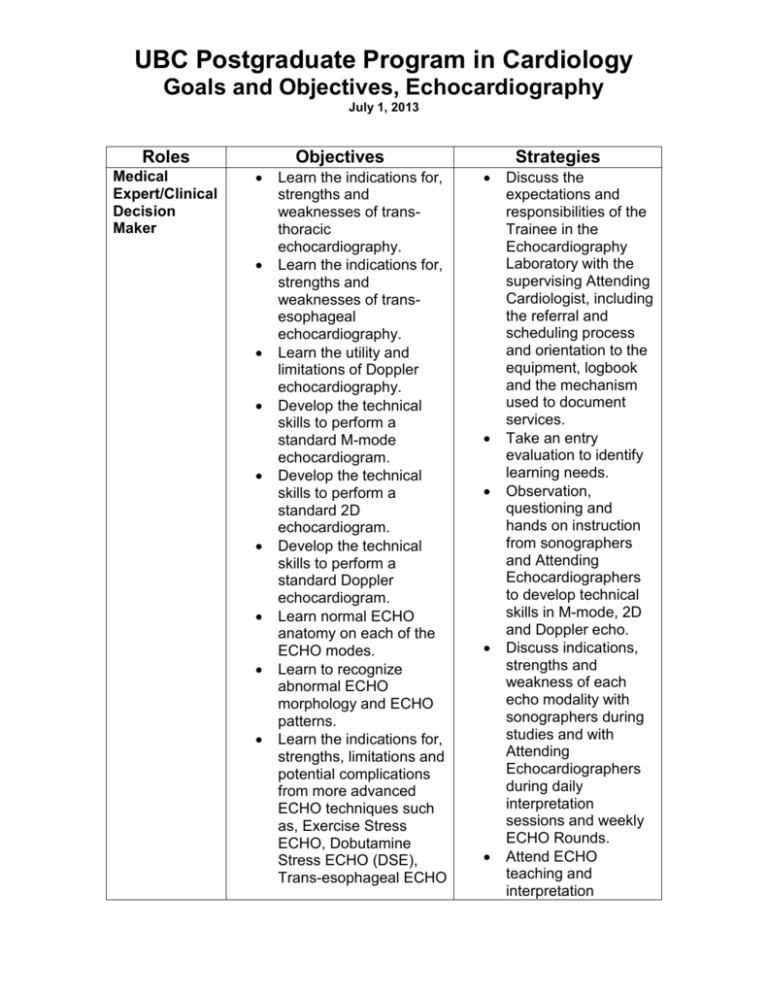
UBC Postgraduate Program in Cardiology Goals and Objectives, Echocardiography July 1, 2013 Roles Medical Expert/Clinical Decision Maker Objectives Learn the indications for, strengths and weaknesses of transthoracic echocardiography. Learn the indications for, strengths and weaknesses of transesophageal echocardiography. Learn the utility and limitations of Doppler echocardiography. Develop the technical skills to perform a standard M-mode echocardiogram. Develop the technical skills to perform a standard 2D echocardiogram. Develop the technical skills to perform a standard Doppler echocardiogram. Learn normal ECHO anatomy on each of the ECHO modes. Learn to recognize abnormal ECHO morphology and ECHO patterns. Learn the indications for, strengths, limitations and potential complications from more advanced ECHO techniques such as, Exercise Stress ECHO, Dobutamine Stress ECHO (DSE), Trans-esophageal ECHO Strategies Discuss the expectations and responsibilities of the Trainee in the Echocardiography Laboratory with the supervising Attending Cardiologist, including the referral and scheduling process and orientation to the equipment, logbook and the mechanism used to document services. Take an entry evaluation to identify learning needs. Observation, questioning and hands on instruction from sonographers and Attending Echocardiographers to develop technical skills in M-mode, 2D and Doppler echo. Discuss indications, strengths and weakness of each echo modality with sonographers during studies and with Attending Echocardiographers during daily interpretation sessions and weekly ECHO Rounds. Attend ECHO teaching and interpretation UBC Postgraduate Program in Cardiology Goals and Objectives, Echocardiography July 1, 2013 Medical Expert/Clinical Decision Maker (TEE) and Contrast ECHO. Understand the impact of echocardiography on patient assessment and management. sessions for discussion and instruction regarding the M-mode, 2D and Doppler features of normal and abnormal cardiac anatomy including left ventricular systolic and diastolic dysfunction, cardiomyopathies, pulmonary hypertension, valvular regurgitation and stenosis, prosthetic valves, pericardial disease, intracardiac masses and thrombus and common congenital cardiac anomalies. Attend and observe more advanced ECHO studies including Treadmill Stress ECHO, Dobutamine Stress ECHO, Transesophageal ECHO, Contrast ECHO and Intraoperative ECHO. Discuss indications, strengths and weaknesses of more advanced ECHO techniques with Attending Echocardiographers and at ECHO Rounds. Correlate ECHO UBC Postgraduate Program in Cardiology Goals and Objectives, Echocardiography July 1, 2013 Communicator Collaborator To be able to obtain appropriate information from the patient and/or family relevant to the performance of a planned ECHO study. To be able to describe the indications, rationale, conduct and possible outcomes, including potential complications of the planned advanced ECHO studies (TEE, exercise stress ECHO, DSE) to the patient and family and to ask for informed consent for the procedure. Learn to write a preliminary ECHO report. Learn to discuss report of ECHO studies with patients, family and referring physicians, including an assessment of the significance of the findings when appropriate. Learn to work cooperatively with other Health Care Professionals who are involved in the care of findings with other imaging modalities whenever possible. Study appropriate references and/or do literature searches to become familiar with the basic science and clinical aspects of Echocardiography. Enters the ECHO report into the Hospital’s Patient Care System (PCS) during interpretation sessions under the supervision of the Attending Echocardiographer. When appropriate communicates the result of an ECHO study verbally to the Referring Physician and/or House-Staff Team. When appropriate, discusses the findings of an ECHO study with the patient and family. Respect the roles of all members of the Health Care Team in the Echocardiography Laboratory. UBC Postgraduate Program in Cardiology Goals and Objectives, Echocardiography July 1, 2013 Manager Health Advocate patients in the Echocardiography Laboratory. Learn to work cooperatively with the staff in the Echocardiography Laboratory to facilitate appropriate and efficient patient care. Learn the cost effectiveness of the various procedures performed in the Echocardiography Laboratory. Learn to manage the Echocardiography Laboratory resources effectively and efficiently. To gain an understanding of waiting lists for various types of echocardiographic studies. Seek consultation from other members of the Health Care Team in the Echocardiography Laboratory when appropriate. Review literature and /or discuss with the Attending Cardiologist in the Echocardiography Laboratory regarding the cost effectiveness of procedures to be done in the Echocardiography Laboratory. Review and help prioritize the inpatient list of patients referred for ECHO studies. Learn strategies to effectively educate patients who have cardiac pathology and their families regarding the pathophysiology of the patient’s illness and the importance of compliance and the potential for future risk. Learn strategies to educate patients and their families regarding healthy cardiac behaviors. Initiate discussion or be available for patients and their families to discuss the patient’s illness with regards to pathophysiology of their disease and the importance of compliance to the prescribed regimen as it relates to their procedure in the Echocardiography Laboratory. Initiate or be available to discuss with UBC Postgraduate Program in Cardiology Goals and Objectives, Echocardiography July 1, 2013 Scholar Professional Enhance knowledge base regarding a variety of cardiac conditions seen in the Echocardiology Laboratory. Develop a strategy for literature review/search for a variety of cardiac conditions seen in the Echocardiography Laboratory. To deliver care of the highest quality with integrity, honesty and compassion. To learn the ethical, legal and professional obligations in the context of patient management in the Echocardiography Laboratory. patients and their families regarding healthy cardiac behaviors as appropriate. Establish and maintain reference resources including textbooks, journals and internet (e.g. Medline) relevant to the care of patients undergoing ECHO studies. Establish and adhere to a study program as it relates to the care of patient undergoing ECHO studies. Maintain professional relationships with all members of the Health Care team. When appropriate seek advice and assistance. Present and discuss case/s seen in the Echocardiography Laboratory at Cardiology Rounds with a focus on the legal or ethical aspects of the case.


